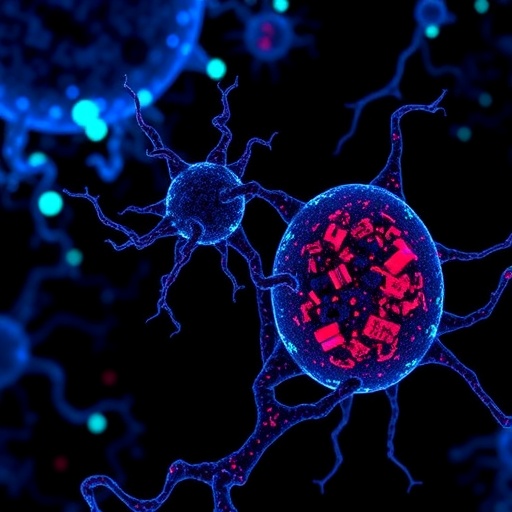In a groundbreaking study that could redefine our understanding of prostate cancer biology, researchers have uncovered the pivotal role chromatin remodeling plays in tempering the oncogenic potential within prostate tumor cells. This pioneering research sheds light on the complex interplay between chromatin dynamics and cancer progression, offering new avenues for therapeutic interventions against one of the most prevalent malignancies affecting men worldwide.
At the core of this discovery lies chromatin remodeling, a fundamental cellular process involving the reorganization of chromatin architecture to regulate gene expression. The researchers, led by Rosti, Lembo, and Petrini, systematically dissected how alterations in chromatin structure influence the behavior of prostate cancer cells, revealing that chromatin remodeling acts as a critical brake on oncogenic functions that drive tumor growth and metastasis.
Chromatin, composed of DNA wrapped around histone proteins, is not merely a static scaffold for genetic material; instead, its dynamic remodeling controls access to genomic information by transcriptional machinery. Aberrant remodeling can thus incite dysregulated gene expression, fostering malignant transformation. The team’s investigation elucidated that proper remodeling is crucial for maintaining cellular homeostasis, and its disruption can unleash oncogenic pathways in prostate cancer.
Advanced molecular and genomic techniques allowed the scientists to map chromatin accessibility and remodeling patterns across various prostate cancer models. Their comprehensive analyses revealed that when chromatin remodeling complexes malfunction or are inhibited, oncogenic transcriptional programs become hyperactivated, promoting uncontrolled proliferation and survival of cancer cells. This discovery underscores the double-edged nature of chromatin remodeling, serving not only to facilitate gene expression but also restraining pathological transcriptional amplification.
One of the study’s illuminating revelations pertains to the interplay between chromatin remodeling factors and key oncogenes known to drive prostate cancer. The findings demonstrated that functional chromatin remodelers suppress oncogenic gene expression by modulating chromatin states, effectively restricting the malignant transformation induced by these oncogenes. This regulatory mechanism offers an intrinsic defense within cells against tumorigenesis.
Notably, the research highlights the potential of targeting chromatin remodeling pathways as a novel therapeutic strategy. By restoring or enhancing remodeling activity, it may be possible to re-establish the transcriptional control that keeps oncogenes in check. This approach could complement existing therapies, potentially overcoming resistance mechanisms that plague current treatment modalities.
The investigative team employed a constellation of cutting-edge technologies, including high-resolution chromatin immunoprecipitation sequencing (ChIP-seq), assay for transposase-accessible chromatin sequencing (ATAC-seq), and CRISPR-based functional screens, to unravel the molecular circuitry governing chromatin remodeling in prostate cancer. These tools enabled precise dissection of chromatin landscapes and identification of critical remodeling components influencing oncogenic pathways.
Moreover, the study detailed how specific chromatin remodeling complexes such as SWI/SNF and NuRD exert tumor-suppressive effects by orchestrating nucleosome positioning and histone modifications. Dysregulation or loss of these complexes correlated strongly with aggressive cancer phenotypes, as observed in patient-derived tumor samples and experimental models, underscoring their vital role in restraining malignancy.
The researchers also probed the downstream consequences of impaired chromatin remodeling on cellular metabolism, signaling cascades, and immune evasion. They discovered that dysfunctional remodeling can enhance metabolic pathways favoring cancer cell survival and dampen immune surveillance, further facilitating tumor progression. These insights hint at the multifaceted impact of chromatin dynamics extending beyond gene regulation to the broader tumor microenvironment.
Importantly, the study unveiled epigenetic vulnerabilities intrinsic to prostate cancer cells with compromised chromatin remodeling. Exploiting these vulnerabilities through epigenetic drugs or synthetic lethal approaches could provide a precise attack against cancer cells while sparing normal tissue, illustrating a future direction for precision oncology.
The implications of these findings extend beyond prostate cancer, suggesting a universal principle wherein chromatin remodeling serves as a gatekeeper against oncogenic transformation in diverse cancer types. This conceptual advancement repositions chromatin remodeling from a mere facilitator of gene expression to a central arbiter of cellular identity and cancer suppression.
Furthermore, the research team underscored the dynamic nature of chromatin remodeling, whereby temporal regulation is essential during cancer progression. This temporal dimension adds a layer of complexity, indicating that therapeutic timing and context will be critical for interventions targeting remodeling pathways to achieve optimal outcomes.
The study also sparks interest in the development of biomarkers based on chromatin remodeling status, which could aid in patient stratification, prognosis, and monitoring response to therapy. Such biomarkers would represent a significant step toward personalized medicine in prostate cancer management.
Overall, this seminal work by Rosti, Lembo, Petrini, and colleagues marks a paradigm shift in understanding the epigenetic regulation of cancer. By spotlighting chromatin remodeling as a natural barricade against oncogenesis, it opens fertile ground for innovative therapeutic strategies designed to harness this endogenous tumor-suppressive mechanism.
As prostate cancer remains a leading cause of cancer mortality globally, these insights arrive at a crucial juncture, promising to inform clinical practice and drug development. The integration of chromatin remodeling biology into the oncological landscape holds the promise of improving patient outcomes by mitigating the aggressive behavior of prostate tumors.
This comprehensive research heralds a new chapter in cancer epigenetics, providing a molecular framework that could transform the fight against prostate cancer and potentially other malignancies characterized by aberrant chromatin remodeling. The scientific and medical communities eagerly await further developments as these discoveries progress from bench to bedside.
Subject of Research: The role of chromatin remodeling in restraining oncogenic functions in prostate cancer.
Article Title: Chromatin remodeling restrains oncogenic functions in prostate cancer.
Article References:
Rosti, V., Lembo, G., Petrini, C. et al. Chromatin remodeling restrains oncogenic functions in prostate cancer. Nat Commun 16, 9174 (2025). https://doi.org/10.1038/s41467-025-64213-4
Image Credits: AI Generated




